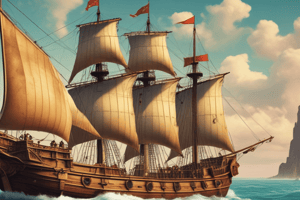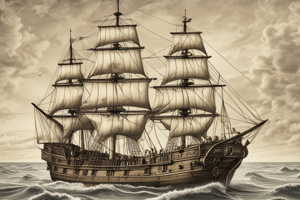Podcast
Questions and Answers
What was the main reason European access to Asia was blocked?
What was the main reason European access to Asia was blocked?
- The Ottoman Empire took over the trade routes (correct)
- The Mongol Empire was at war with Europe
- The Silk Road was closed due to natural disasters
- Asian goods were too expensive for Europeans
Who founded a navigation school in Portugal?
Who founded a navigation school in Portugal?
- Infante Enrique (correct)
- King John II of Portugal
- Christopher Columbus
- Marco Polo
What was the name of the island in the Bahamas that Christopher Columbus reached?
What was the name of the island in the Bahamas that Christopher Columbus reached?
- Vinland
- San Salvador (correct)
- San Juan
- Santa Maria
Why did the Vikings abandon Vinland?
Why did the Vikings abandon Vinland?
What was Christopher Columbus's main motivation for sailing west across the Atlantic?
What was Christopher Columbus's main motivation for sailing west across the Atlantic?
Where did Columbus believe he had reached?
Where did Columbus believe he had reached?
What did Columbus present to the King and Queen in 1493?
What did Columbus present to the King and Queen in 1493?
Where did Columbus establish the first Spanish settlement?
Where did Columbus establish the first Spanish settlement?
What were the later voyages of Columbus marked by?
What were the later voyages of Columbus marked by?
What was the significance of Columbus's voyages?
What was the significance of Columbus's voyages?
Study Notes
Here is a summary of the text in detailed bullet points:
• Before the 15th century, Europe, Asia, and Africa were known to exist, but no other continents were known to Europeans, who were not interested in leaving Europe.
• The Vikings were explorers who reached a place they called "Vinland", but later abandoned it due to harsh weather conditions.
• Europeans wanted to access Asian goods such as silk, cotton, and porcelain, but the Mongol Empire protected trade routes, making it possible for merchants like Marco Polo to travel to Asia.
• Later, the Ottoman Empire took over, blocking European access to Asia, leading to the end of the Middle Ages.
• The Portuguese developed navigation and built advanced ships like caravels, which enabled them to travel longer distances and explore new territories.
• Infante Enrique, a Portuguese prince, founded a navigation school and taught astronomy and navigation, attracting many students, including Christopher Columbus.
• Christopher Columbus, a Genoese navigator, was fascinated by Marco Polo's book and believed he could reach Asia by sailing west across the Atlantic.
• Columbus presented his plan to King John II of Portugal, but was rejected, so he went to Spain and presented his plan to King Ferdinand and Queen Isabella, who initially rejected him but later accepted his proposal.
• Columbus set sail on August 3, 1492, with three ships: the Pinta, the Niña, and the Santa Maria, and after 33 days, he reached an island in the Bahamas, which he named San Salvador.
• Columbus believed he had reached the East Indies and called the native people "Indians", but in reality, he had reached the Americas.
• Columbus explored several islands in the Caribbean, including Cuba and Hispaniola (present-day Haiti and the Dominican Republic), and established the first Spanish settlement in the Americas.
• Columbus returned to Spain in 1493 and presented his findings to the King and Queen, showing them gold, spices, and native people he had brought back.
• Columbus made three more voyages to the Americas, exploring more islands and establishing colonies, but his later voyages were marked by conflicts with native people and other Europeans.
• Columbus was eventually arrested and brought back to Spain, where he was accused of mistreating native people and mismanaging his colonies.
• Despite his mistakes, Columbus's voyages opened up the Americas to European exploration and colonization, leading to a significant exchange of cultures, goods, and ideas between the Old and New Worlds.
Studying That Suits You
Use AI to generate personalized quizzes and flashcards to suit your learning preferences.
Description
Test your knowledge about the early European explorers, particularly Christopher Columbus, who ventured into the unknown to reach Asia but ended up discovering the Americas. Learn about the motivations behind his voyages, the challenges he faced, and the impact of his discoveries on the world.




